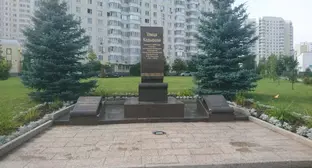13 June 2022, 15:25
Week in the Caucasus: review of main events of June 6-12, 2022
Persecution of pacifists in Southern Russia; decision of the ECtHR on a complaint of Jehovah‘s Witnesses* from Taganrog; hunger strikes of political prisoners in Azerbaijan; decrease in protest activity in Armenia, – see the review of these and other events in the Caucasus during the week of June 6-12, 2022, prepared by the “Caucasian Knot”.
Persecution of pacifists in Southern Russia
In Southern Russia, the persecution of residents who oppose the special military operation in Ukraine and related events continues. So, on June 6, it was reported that a court imposed a fine of 40,000 roubles on a resident of Vladikavkaz for posts on social media discrediting the Russian Armed Forces. On June 8, in Novorossiysk, the second protocol under the article on discrediting the Russian Armed Forces was drawn up against Askhabali Alibekov, known as an author of the “Wild Paratrooper” blog, after he posted a video on the Internet calling for a stop to the special military operation in Ukraine. Besides, on June 8, it was reported that a court in Kropotkin fined blogger Alexander Shabanov 35,000 roubles for posting videos calling against the special military operation in Ukraine.
On June 9, in Stavropol, a court fined local activist Savely Morozov 40,000 roubles, finding him guilty of discrediting the Russian Armed Forces. Earlier, Savely Morozov requested the military enlistment office to provide him with the opportunity to perform alternative service. He reported to the draft board the reasons for refusing military service, and on the other day, the police drew up a protocol against him on discrediting the Russian Armed Forces. On June 10, in Krasnodar, a court fined local resident Yevgeny Kaliberov for discrediting the Russian Armed Forces. On the same day, it was reported that in Sochi, a court fined blogger Anna Kolmagortseva 15,000 roubles, finding her guilty of abusing the freedom of the mass media in an interview with Vladimir Atamanchuk, a coordinator of the “Civic Initiative” public movement, who spoke out against the special military operation in Ukraine. Moreover, this week, among those accused of discrediting the Russian Armed Forces were residents of other regions, including the Rostov Region, Kabardino-Balkaria, and Ingushetia. Besides, Adyg activist Kase Kik complained about the detention and torture after he asked to perform a Ukrainian song in a cafe and expressed his attitude towards the special military operation. The man was charged with petty hooliganism, and court sentenced him to seven days of arrest.
Decision of ECtHR on complaint of Jehovah‘s Witnesses* from Taganrog
On June 7, the European Court of Human Rights (ECtHR) pronounced a decision in a case on “MRO Taganrog and Others v. Russia”, which brought together 20 complaints filed by Jehovah’s Witnesses* from 2010 to 2019. According to the ECtHR’s decision, by banning the activities of organizations of Jehovah’s Witnesses*, recognizing them as extremist, Russia violated four articles of the European Convention on Human Rights, including the right to freedom of thought, conscience and religion. The ECtHR awarded 3,447,250 euros in compensation for non-pecuniary damage and demanded the return of all confiscated property to the believers or reimbursement of its value. In addition to the believers from Taganrog, the ECtHR’s decision mentions complainants from Tver, Samara, Gorno-Altaisk, Nizhnekamsk, Birobidzhan, Kemerovo, and the Krasnodar and Krasnoyarsk Regions. The decision of the ECtHR was announced amid the adoption by the Russian State Duma of a package of laws on non-execution of ECtHR judgments in Russia. According to the amendments, adopted in the third reading on June 7, the decisions of the Strasbourg Court adopted after March 15, 2022, from the date of submission of the Russia’s application for withdrawal from the Council of Europe, will not be enforced.
Hunger strikes of political prisoners in Azerbaijan
On June 3, Talekh Bagirzade, the leader of the “Muslim Unity” movement, who was convicted in Azerbaijan, went on a hunger strike demanding punishment for the law enforcers, who, according to supporters of the “Muslim Unity” movement, were blaspheming while torturing believers. The law enforcement bodies reject allegations of torture and blasphemy. On June 6, as a sign of solidarity with Talekh Bagirzade, members of the “Muslim Unity” movement Abbas Guseinov and Djabbar Djabbarov, as well as journalist Polad Aslanov, imprisoned in Azerbaijan, began a hunger strike. Later, Firudin Zeinalov, convicted in the “Ganja case”, and members of the “Muslim Unity” movement Seifaddin Shirvanov and Djakhad Babakishizade joined the hunger strike. On June 9, Djabbar Djabbarov and Polad Aslanov stopped their protest action because of health problems and threats of a ban on phone conversations with their relatives. Meanwhile, on June 10, it was reported that six more believers joined the Talekh Bagirzade’s hunger strike in the prisons of Azerbaijan. In total, 11 people take part in the protest action.
On June 7, Ali Aliev, the leader of the “Citizens and Development” Party (CDP), who was convicted in Azerbaijan, declared a protest hunger strike. On June 8, Ali Aliev’s two deputies Zaur Gasimov and Zeinal Abdullaev went on a hunger strike in solidarity with him. According to analysts interviewed by the “Caucasian Knot”, Ali Aliev has recently intensified his criticism of the authorities, and that fact has become the reason for his persecution.
Decreased protest activity in Armenia
In Yerevan, the opposition continues daily actions demanding the resignation of Armenian Prime Minister Nikol Pashinyan, launched on April 25 in connection with his statement about the possibility of “lowering the bar” on the status of Nagorno-Karabakh. During a protest action on June 9, protestors expressed their hope that Russia would fulfil its obligations as a co-chair of the OSCE Minsk Group and would not go beyond the statements adopted by the co-chairs on the fate of Nagorno-Karabakh. At a protest action held in front of the Russian Embassy, oppositionists accused Russian Foreign Minister Sergey Lavrov, who was in Yerevan that day, of putting pressure on Armenia on the Nagorno-Karabakh issue. On June 11, the youth wing of the “Resistance” opposition movement held a march in Yerevan demanding the release of activists detained at recent protest actions. The protesters called the detainees political prisoners and said that the authorities were trying to extinguish the opposition movement with arrests. It should be noted that, according to the data of the “Union of Informed Citizens”, the dynamics of participation in the protest movement is declining. So, if on May 1, over 12,500 people took part in the opposition rally, then by the end of the month, on May 28, the opposition rally gathered about 5850 people. Two June rallies gathered 2870 people on June 3 and 2350 people on June 9. Armenian political analysts interviewed by the “Caucasian Knot” noted the lack of broad public support for the protest movement. According to the analysts, the protest actions may come to naught if the opposition does not move on to substantive changes.
*396 Russian organizations of Jehovah’s Witnesses are recognized as extremist, and their activities in Russia are banned by court’s decision.
This article was originally published on the Russian page of 24/7 Internet agency ‘Caucasian Knot’ on June 13, 2022 at 09:30 am MSK. To access the full text of the article, click here.




